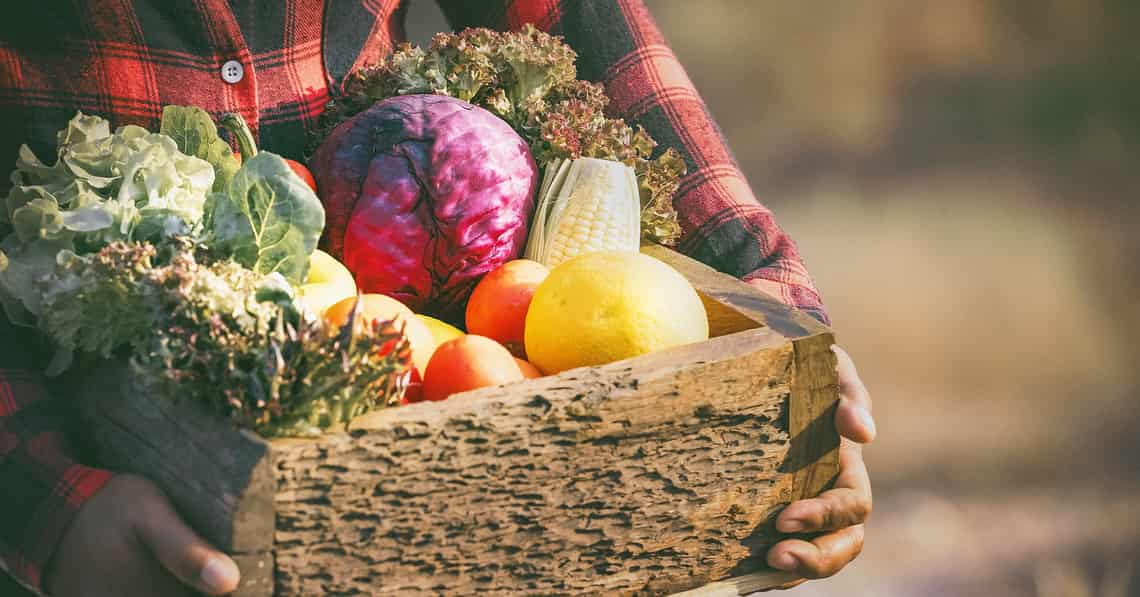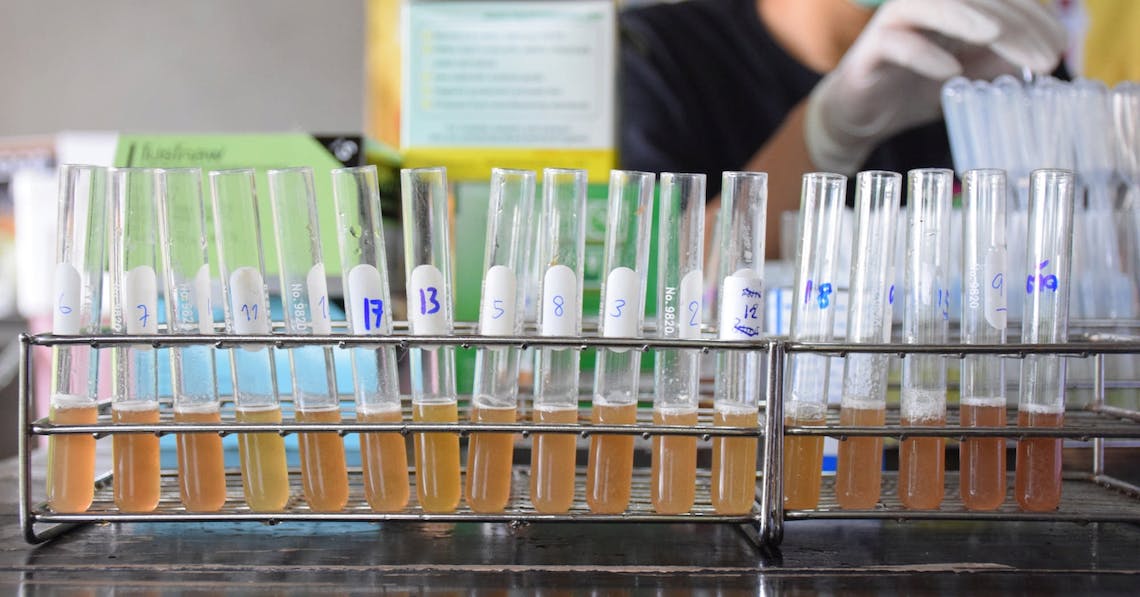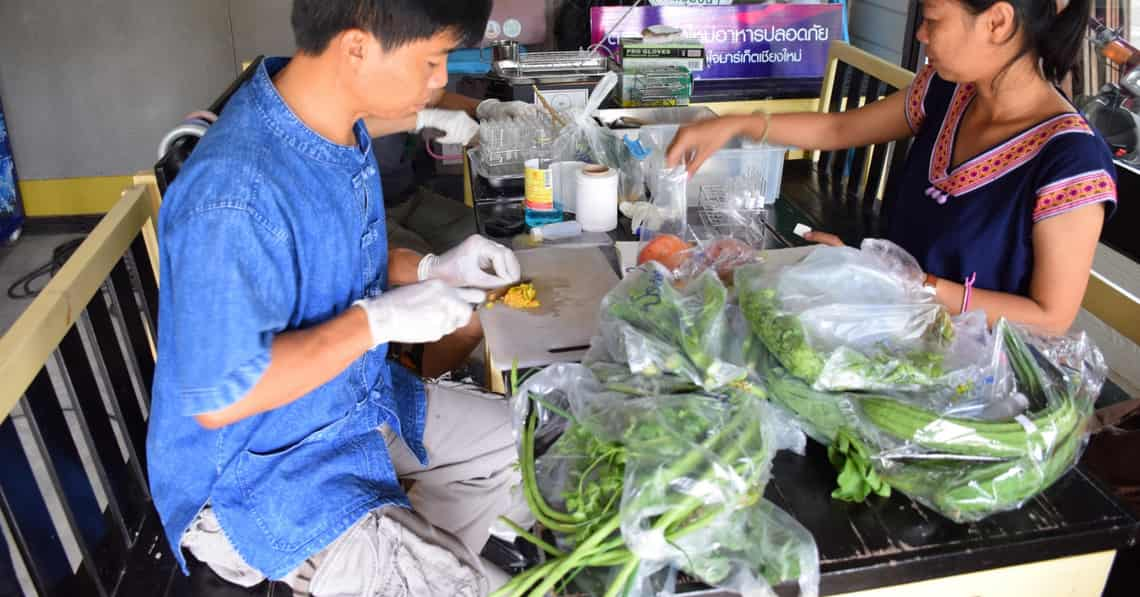Anyone who frequents local supermarkets and the more popular weekend markets will have noticed that over the past few years, a growing number of ‘organic’ produce are hitting the shelves. Mass produced vegetables and fruits are being tucked out-of-sight on the lower shelves, as these glowing ‘natural’ produce are given centre stage…at a much higher price point of course. Advertised proudly as being organic, natural, clean, safe, and pesticide free, the reality is that many of these terms are, whether intentionally or not, misused. The producers may not be setting out to hoodwink the public, but a lack of clarity in definition leads to free-wheeling labelling which confuses not just the consumers but often even the producers themselves. What’s the difference between an all-natural organic cabbage and a pesticide free, safe cabbage grown on an organic farm? For those in the know, this topic may be a damp squib, but for most of us, the world of labelling and branding has left us unsure and distrustful of the industry as a whole.
Although popular media may suggest this organic trend is straight out of a western hipster fad obsessed with quinoa shakes and debilitating raw food diets, here in the east the concept of self-sufficiency through home-grown gardens and local farms has been around some time; a natural extension of our more recent past practices. Just as the rest of the world, we have also been pushed out or pulled in by large conglomerates, with local farms of yesteryear disappearing and markets stocking more monoculture products in plastic bags, leaving the origin of such vegetables to our imagination. Transparency was gone and a trust in what we were consuming began to fall. But what we do have is a movement, a movement away from pesticides and chemicals, in favour of more natural alternatives.
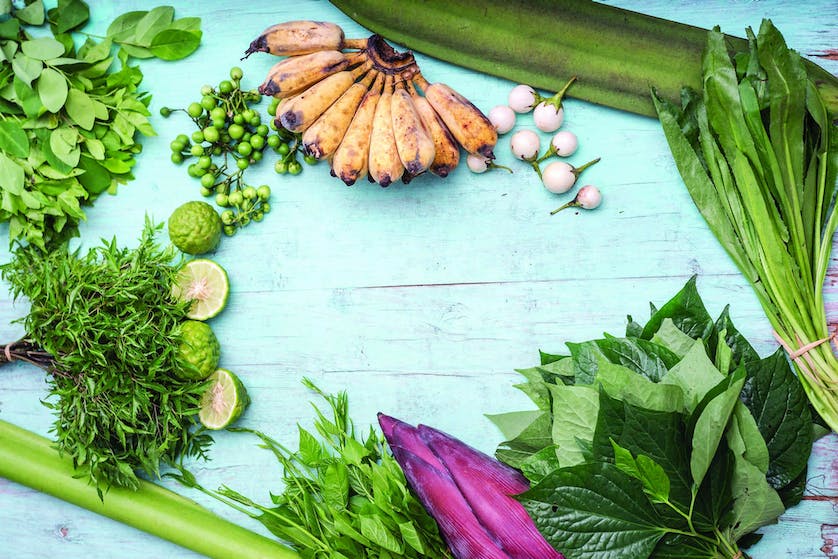
A Global Shift
In the late 1940s, following the devastating shocks of the 1930s financial crisis and two World Wars, a new farming concept swept the world. This productivist food regime was born under the idea that the world could suffer a collective food shortage, giving rise to new programmes out of America and Europe that were aimed exclusively at keeping the world fed. Influenced by Adam Smith’s free market economic theory and the concept of division of labour, farms would grow one crop and guarantee a yield.
“This soon led into the Green Revolution, a move that changed farming forever,” explained Dr. Chomchuan Boonrahong of Maejo University who has experience working with a number of agricultural NGOs. “Although the green revolution gave high yield through a combination of genetics, environment control and management, the plants soon became weak. The monoculture system saw farmers mass producing one crop, year after year, opening the land up to disease, pests and infertile soils. The environment needed to be controlled and so we nurtured our crops in greenhouses, we made chemicals that would stop the pests and re-energise the depleting soils. This system can be seen clearly throughout Thailand, with each province famed for one type of crop, longans in Chiang Mai, pineapples in Lampang and lychees in Lamphun.”
A chicken and egg scenario emerged, with both sides accusing the other of manipulating the market.
This uphill battle with nature to keep yields high year after year inevitably saw the use of more and more chemical fertilisers, herbicides and pesticides. The free market, often influenced by governments and middle men who want to keep costs down and competition high, forces farmers to keep production costs low in order to make a profit.
“With everything strictly controlled, the consumers began dictating what was and wasn’t sellable,” said Dr. Chomchuan. “If we didn’t like the bitter taste of a salad leaf, it would be made sweeter. If we wanted plumper, redder tomatoes then that’s what we got. Soon vendors saw that only the best crops were being bought, causing those crops that were less than perfect to be regarded as unfit for sale.”
A chicken and egg scenario emerged, with both sides accusing the other of manipulating the market. Consumers constantly accuse vendors for not even trying to sell anything but perfect crops. Vendors respond with stories of failed attempts of trying to sell varied produce to consumers who are accustomed to perfection. This vicious cycle has led to a food waste epidemic, with roughly 1.3 billion tonnes of food being wasted every year — enough to sustain the one billion people suffering from hunger globally, according to a 2016 study by the Food and Agriculture Organisation of the United Nations (FAO).
“Today, the normal vegetables we see in the markets and supermarkets will have all been exposed to chemical based fertilisers, herbicides and pesticides. Most farms follow Good Agricultural Practices (GAP), a set of standards issued by the FAO which dictates, among other things, that no chemicals must have been used in the last 21 days leading to the harvest. In Thailand we use the word ‘safe’ to describe these products,” explained Rungnapa Limcharoenporn, owner of UPF Farm in Lamphun and one of the first farmers who began to focus on alternative agriculture in the region back in the 1990s. “When you start steering away from chemicals, farming gets a lot more complicated.” In addition to the term ‘safe,’ the term ‘pesticide free’ is frequently used and despite what you may think, this does not actually mean the production was pesticide free. These products are still exposed to chemical pesticides, herbicides and fertilisers, but are subject to more rigorous regulations. Their harvests must also be checked for relatively non-existent levels of chemicals before they can be sold. In Thailand, the Royal Project devised a testing method that is now in use across the country.
What is Organic?
“I don’t think real organic even exists in Thailand anymore,” said Rungnapa. “The ideal organic farm means that the land must not have been contaminated by chemicals for five years or more, the water used is pure, the surrounding environment is also not contaminated and the only fertilisers used are natural. This just doesn’t exist. Believe me, I tried.” This basic definition is accurate, but the real meaning behind the word ‘organic’ goes much deeper into society than you may think.
In Thailand, the Organic Agriculture Certification Thailand defines organic agriculture as a holistic production management system which promotes and enhances agro-ecosystem health, including biodiversity, biological cycles, and soil biological activity. It emphasises the use of management practices in preference to the use of off-farm inputs, taking into account regional conditions that require locally adapted systems. This is accomplished by using, where possible, agronomic, biological, and mechanical methods, as opposed to using synthetic materials, to fulfil any specific function within the system.
“I don’t think real organic even exists in Thailand anymore.”
“Organic farming is a complicated system that focuses on a variety of things in the farm that help imitate a natural ecosystem, and is best suited to local consumption — building community bonds and a system free from market cost manipulation,” clarified Dr. Chomchuan. “It’s basically like going back in time, back to when we were not mass producing and food was bought locally and seasonally.” Rungnapa suggested that if you want to eat organic fruit and vegetables, you should grow them in your garden — but even then fully organic crops are not guaranteed.
Gardeners, farmers or producers must be aware of external contaminates: the organic fertiliser may be made from manure from hormone fed animals, the local water source may have chemicals in it, and the land may still have residue chemicals from years gone by. Those who combine organic produce from several sources must be able to ensure every step of the way is uncontaminated before they can legitimately call themselves organic.
Currently there are three methods used to check whether a farm is organic. The first is Third Party — whereby a certification body such as The National Bureau of Agriculture Commodity and Food Standards (ACFS) or Organic Thailand visit the farm and run tests in order to issue a certificate that confirms their organic status or pesticide free status. The second system is the Participatory Guarantee System, whereby consumers collaborate with producers and both work towards checking authenticity. Consumers are unable to check every farm every time they buy so usually the vendor such as a supermarket or a market owner will take responsibility in checking on behalf of their consumers. The third system is whereby farmers set up their own network and their own standards and leave it up to the consumer to decide whether or not to buy their produce.
Keeping it Local
Local markets are always a better choice for consumers according to Dr. Chomchuan. “Supermarkets that sell organic produce mark up the price considerably, and the produce is not always fresh. If farmers sell in their local community, the produce is fresher and certificates are not necessarily needed. Buying and selling locally is a system based on trust. If you live near the farms you can make a judgement call as to the quality of the produce for yourself.” He continues by adding that it is only worthwhile for farmers to seek certification if they are selling outside of their local community, in order to instil a sense of trust in the consumer.
In Chiang Mai there are 18 organic markets which are part of the Institute for Sustainable Agricultural Communities (ISAC), and a few more that are independent.
ISAC was set up in 1991 to encourage and expand sustainable agriculture and improve farmer and consumer welfare. In order to increase the number of organic farms, in Chiang Mai as well as across Thailand, there is a National Plan for Organic Farming that aims to increase organic farming to a total of 1.3 million rai by 2021 and reserve 40% of all organic produce for domestic consumption.
Yet despite this growing interest and support for organic markets, regular farming complete with chemical fertilisers and pesticides are still common place around Chiang Mai. According to Rungnapa, eating locally is the first step towards a healthier and more bio-diverse world, whether it is organic or not. “Organic farming is not for the mass market,” she claims. “It’s for locals who need not venture far, and those that are accustomed to seasonal eating. We have social media to help farmers connect directly with consumers and this can stimulate the local economy. The current mass production system is just not sustainable anymore and buying locally also reduces the carbon footprint of the products being sold.” Selling locally also encourages more transparency from the vendors in order to ensure customer satisfaction and repeat sales.
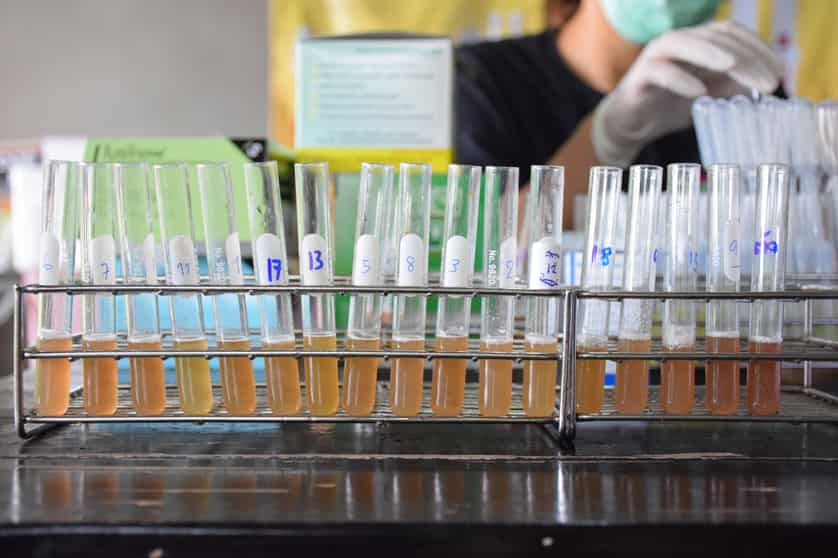
The Jing Jai Organic Farmers Market, established over 10 years ago and the first of its kind in Chiang Mai, is a perfect example of how a Participatory Guarantee System works. “Although all our vendors do need a certificate as proof of quality, we also had to educate ourselves and now conduct weekly tests on the products being sold to double check on behalf of the consumer,” explained Ormkwan Sanasen, the Business Development General Manager of Jing Jai Market.
“We take 40 random samples every weekend and test them in our lab.”
Today, following a model devised by the Chiang Mai Provincial Public Health Office, the market managers visit every farm that requests a stall at their market to conduct their own tests. “After we test and give them the green light, if we discover they are selling a product that we have yet to approve or products that are contaminated we refuse to let them sell at our market,” explained Varunee Issarawongwiwat, Jing Jai Farmers Market manager. “We also take 40 random samples every weekend and test them in our lab. It costs us over 1,000 baht a week but we do it for our customers, none of whom have the time nor the resources to test every farm before they buy. In order to ensure only the best organic produce are being sold, we also have a strict three strike policy for all our vendors to ensure that our customers can be sure they are buying what is advertised.”
Transorganic Farming
Mass produce farming is ingrained in society and transitioning to organic farming can be a struggle. “As a farm we can see the benefits and struggles that farmers may encounter when transitioning to organic,” said Peggy Reents, the co-founder of Pun Pun, an organic farm and sustainable learning centre in Chiang Mai. “The transition to organic often produces less yield during the first few years and the market is less certain.” Farmers sometimes want to transition but cannot take the risk, and despite the concept of trust around organic farming, she believes there is growing distrust between farmers and consumers. “A lot of distrust comes from the many ways there are to describe products,” she explained. “The labelling and wording of products make consumers unsure of what they are buying and so to rebuild this trust there needs to be clear definitions, ideally without added paperwork and certification.” Interestingly, Pun Pun has no organic certification, though claims to be organic, which just goes to show how confusing the whole situation is. Terms like pesticide-free push consumers away when they learn that pesticides are still allowed, and the organic market is adopting a range of legal vocabulary to describe their products clearly and consistently. “Farmers and vendors are all trying to be as transparent as they can, but the more words that are used to describe smaller differences the more the consumers are distrustful and confused,” she continues. “Another issue is the price point. Much of the organic veg out there is overpriced, whereas in reality, organic veg is pretty much the same price as any other veg.”
Dr Chomchuan offered another interpretation by suggesting that organic veg appears overpriced but in fact is the real price we should be paying for vegetables already. “The middle men artificially push the price of mass produced crops so low that consumers are now conned into thinking that is the real price,” he said. “Sometimes supermarkets charge too much for organic produce but really the difference in price is that monoculture farmers are just being delt a bad deal and have to submit to low sale prices to keep themselves in the market. If all fruit and veg was brought up to a fair trade price then the whole country would revolt, so the government also has vested interest in keeping the price as low as possible for as long as possible.”
This, paired with the low costs imposed on mass produced crops makes it difficult for the consumer to find a fair price that satisfies both sides and their wallets. Only at local markets can the real cost of organic produce be realised.
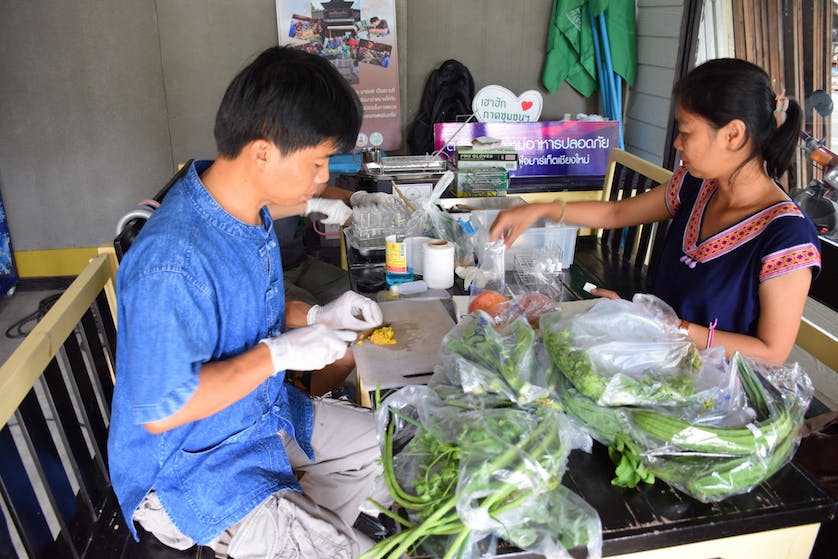
In addition to organic farming and education, Peggy’s partner and co-founder of Pun Pun, Jon Jandai, set up a network called Tham Turakit, which is a community of farmers who have transitioned to natural farming. Their fair-trade network was inspired by self-sufficiency, Buddhist philosophy and environmental care. They offer a chance for any farmer interested to learn and transition to natural farming, with a focus on heart over profits. According to Peggy, they have devised ways that help farmers retain a good yield during the transition and in some cases increase yield. “One farm working with Tham Turakit is now producing four times more organic rice than it did when it was growing standard rice. This greater yield with less inputs means they are now earning more.”
What is a clear after looking deeper into organic farming is that the organic farming industry has to begin with a clearer understanding of what organic means. Apart from the most basic understanding that organic equates to chemical free, we consumers must make a more conscious effort to educate ourselves on the matter. The organic community is a body of people, a network of hardworking farmers and locals that we consumers should try our best to understand and support. More and more markets are opening up around Thailand, opening up access to organic produce and resulting in more farmers making a conscious transition to alternative agriculture. This will hopefully begin to change popular opinion and many believe that these alternative agricultural methods could one day take over regular monoculture chemical based farming…all we consumers need to do is influence the market and fall in love once again with the uglier pieces of fruits and vegetables.
